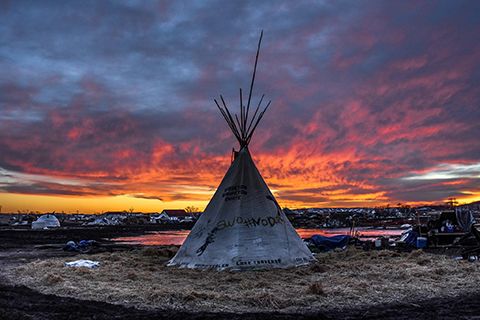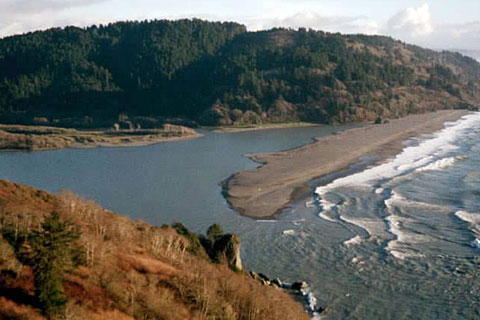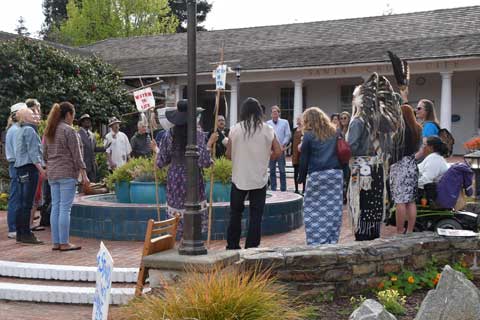Feature Archives
Mon Jun 5 2017
The Epic Battle Between Big Oil & the People of California
On Thirteenth Street in front of the Sacramento Convention Center where the Democratic Convention was being held on May 20, a group of activists held a mock “tug of war" between the people of California and the oil industry for the loyalty of Governor Jerry Brown. The skit depicted the contradiction between Jerry Brown the “climate leader,” who appeals to his Democratic base by preaching against climate change and for green energy, and the other guy, “Big Oil Brown,” who supports the expansion of fracking in California and the construction of the Delta Tunnels — and has received millions in contributions from the oil and energy industries.
Mon May 15 2017 (Updated 05/20/17)
Standing Rock Copwatchers in the Bay Area
Standing Rock Copwatchers write: In 2016, we left our families, our homes, our lives to go defend the water at Standing Rock, North Dakota. We stood in struggle with hundreds of tribes from across the country and continent. Our fight was for mother earth, and it was for our people, our history, and for our future. We have been traveling from city to city connecting with other people, sharing our stories, speaking about the fight for our earth, and conducting know your rights trainings. Many of us are currently in Oakland. We are fundraising to get the clutch on our bus fixed and for a NoDAPL / Copwatch food truck.
Fri May 5 2017 (Updated 05/16/17)
Reclaim Our Democracy from the Oil Industry
California is often portrayed as the nation's “green leader,” but the reality is much different. Over the 2015-2016 Legislative Session, the oil industry spent a historic $36.1 million to lobby California lawmakers. During the last six years, the industry has spent $122 million in Sacramento, more than any other interest group. “This spending spree has paid huge dividends for these companies, allowing them to dismantle and crush any meaningful legislation that might significantly curb their power to drill and pollute in California,” said David Braun of Rootskeeper. Braun urged people to join a diverse array of activists on Saturday, May 20 for a march and rally in Sacramento.
Sat Apr 22 2017 (Updated 04/23/17)
Famous Herd of Mustangs Faces A Round-Up
In an area in the Pine Nut Mountains east of Gardnerville, Nevada there is a wild horse herd known as the Fish Spring’s herd. This herd has many bands in it, including the Blue’s band, Blondies band, Zorro’s band, Socks band, and Rogue’s band. The bands are named after the lead stallion. There are so few wild horses on that range that wild horse advocates, photographers, and locals name the horses. Wild horses love their families and their freedom, but after they are rounded-up they lose all of that. When the Bureau of Land Management decides the amount of horses exceed the appropriate management area, they organize the rounding up of the excess horses.
Thu Apr 13 2017 (Updated 04/15/17)
City Urged to Reconsider Proposal for New Five-Level Parking Garage
The Campaign for Sensible Transportation states: The City of Santa Cruz is proposing to build a new five-level parking garage above a new relocated city library on the parking lot bordered by Lincoln, Cedar and Cathcart Streets, where the Farmer's Market currently meets. The City should implement a Commuter Benefits Program first, before it considers the construction of a much more costly garage. The Campaign is urging the City to follow the recommendations of its parking consultants: Offer incentives to people who work downtown to get to work on bus, carpool, bicycle and walking. This is a less costly and more environmentally sound way to increase customer parking than building another garage.
Sun Apr 9 2017 (Updated 04/13/17)
Last Generation of Salmon Fishermen, Unless Salmon Runs Improve
Fishery scientists are expecting a record low return of fall-run Chinook salmon to the Klamath River this year, due to a combination of several years of drought, water diversions in the Klamath Basin and to the Sacramento River and the continued presence of the PacifiCorp dams. Tribal, commercial and recreational fishermen are currently waiting for the decision by the Pacific Fishery Management Council (PFMC) on the fishing seasons at its meeting in Sacramento on April 10, but the outlook is dismal, based on the low Klamath salmon estimates.
Sat Apr 8 2017 (Updated 04/09/17)
Santa Cruz City Council Votes Unanimously in Support of the Standing Rock Sioux
On April 4, the Santa Cruz City Council voted unanimously to adopt a resolution in support of the Standing Rock Sioux Tribe in their opposition to the Dakota Access Pipeline (DAPL). Citing DAPL’s violation of treaty rights, destruction of sacred sites and the threat posed to Standing Rock’s water supply, the city’s agenda report advised that Santa Cruz join the many cities across the country in officially “Standing with Standing Rock.” The Council’s resolution was formed as part of a collaborative effort between the city and a coalition of Santa Cruz residents working toward the divestment of city funds from major banks funding the project.








